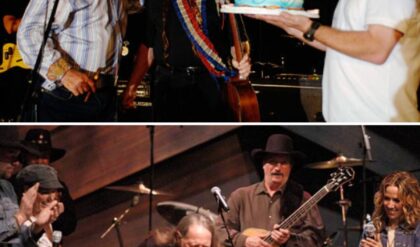In the heart of country music, where tales of heartbreak, redemption, and family ties resonate like a well-strummed guitar, Blake Shelton stands as a towering figure. But beyond the chart-topping hits and the charismatic presence on “The Voice,” Shelton’s most profound role is one that echoes the values instilled in him from childhood: fatherhood. Blake Shelton’s journey into fatherhood is deeply shaped by the powerful lessons from his parents—especially his dad’s unconditional love as a stepfather and the unwavering commitment to family above all else. Discover how these heartfelt values guide Blake’s life today and his devotion to being the best family man he can be. As we delve into the legacy behind the country star’s biggest role, we uncover a story of resilience, love, and the enduring power of family bonds.
Born on June 18, 1976, in the small town of Ada, Oklahoma, Blake Tollison Shelton entered a world far removed from the glitz of Nashville or the sparkle of Hollywood. Ada, with its population hovering around 16,000, was a place where life moved at the pace of the rolling plains, and family was the cornerstone of existence. Shelton’s parents, Dorothy and Richard (affectionately known as Dick) Shelton, embodied the hardworking ethos of Middle America. Dorothy ran a beauty salon, clipping hair and sharing gossip with locals, while Richard sold used cars, haggling deals under the relentless Oklahoma sun. Their home was modest, filled with the sounds of country music legends like George Jones and Merle Haggard, who would later influence Blake’s own career.
From the outset, family dynamics in the Shelton household were a blend of biological ties and chosen love. Dorothy had a son, Richie, from a previous relationship, born when she was young. When Richard married Dorothy, he didn’t hesitate to embrace Richie as his own, raising him from the tender age of one. This act of unconditional love as a stepfather became a foundational pillar in Blake’s understanding of family. “My dad, when he married my mom — my mom [already] had a baby, my brother, Richie,” Shelton recalled in an interview. “He took Richie on and raised him from the time he was 1 year old and my dad is my dad.” Richard’s commitment wasn’t just lip service; it was lived daily, teaching young Blake that family isn’t defined by blood alone but by the choices we make to love and support one another.
Blake’s early years were idyllic in many ways, marked by the simple joys of rural life. He shared a room with his siblings—Richie, his older brother, and later his sister Endy. The family attended church regularly, and Sundays often involved gatherings with extended relatives, where stories were swapped over homemade meals. Richard, a man of few words but immense heart, instilled in his children the value of hard work and integrity. “My dad was the kind of guy who showed up every day, no matter what,” Blake has said, reflecting on how Richard’s reliability shaped his own work ethic. Dorothy, with her nurturing spirit, encouraged creativity, enrolling Blake in music lessons after noticing his natural talent. By age 12, Blake had learned guitar from his uncle and was performing at local events, his voice carrying the raw emotion that would later define his music.
Tragedy struck the Shelton family in 1990, when Blake was just 14 years old. Richie, then 24, was killed in a car accident, a loss that shattered the family’s world. The pain was profound, etching deep scars into Blake’s young heart. “It changed everything,” Shelton later shared, describing how the grief tested the family’s bonds. In the midst of sorrow, Richard and Dorothy’s unwavering commitment to family shone through. They rallied together, supporting one another and their remaining children through the darkness. Richard, in particular, modeled resilience, continuing to provide for the family while allowing space for mourning. This period taught Blake that family is a refuge in storms, a lesson he carries forward. “We stuck together because that’s what families do,” he noted, emphasizing how his parents’ example helped him navigate loss.
As Blake grew into adolescence, the influence of his parents became even more evident. High school in Ada was a mix of academics, sports, and music. Blake wasn’t the top student, but he excelled in areas that mattered to him, like singing in the choir and performing at talent shows. At 15, he wrote his first song, a poignant piece about love and loss that hinted at the emotional depth in his future work. Richard encouraged Blake’s dreams, driving him to gigs and offering quiet advice. “Dad always said, ‘If you’re gonna do something, do it right,'” Blake recalled. Dorothy, meanwhile, fostered his confidence, reminding him that family would always be his safety net.
Graduating high school in 1994, Blake made a bold move: at 17, he headed to Nashville with little more than a guitar and determination. The city of country music dreams was harsh at first. Blake painted houses, waited tables, and faced countless rejections. But the lessons from home—perseverance and family support—kept him going. Phone calls to Richard and Dorothy provided encouragement, with Richard often saying, “Keep at it, son. We’re proud no matter what.” Blake’s breakthrough came in 2001 with “Austin,” a heartfelt ballad that topped the charts for five weeks. Success followed: albums like “Blake Shelton” (2001) and “The Dreamer” (2003) established him as a rising star. Hits like “Ol’ Red” and “Some Beach” showcased his blend of humor and heart, drawing from personal experiences.
Amid professional triumphs, Blake’s personal life reflected the family values he’d learned. His first marriage to Kaynette Williams in 2003 ended in divorce in 2006, a painful chapter that echoed the losses of his youth. Then came his high-profile relationship with Miranda Lambert, whom he married in 2011. Their union, filled with collaborative music and public affection, seemed storybook, but it too ended in 2015. Through these heartbreaks, Blake leaned on his family. Richard’s passing in 2012 from emphysema added another layer of grief, but his father’s legacy of love endured. “Dad taught me what it means to be a man—to love fully and commit,” Blake said in tributes.
Enter Gwen Stefani. The two met on “The Voice” in 2014, both navigating divorces—Blake from Lambert, Gwen from Gavin Rossdale. What began as camaraderie blossomed into love, culminating in their marriage on July 3, 2021, at Blake’s Oklahoma ranch. But this wasn’t just a union of two stars; it was the merging of families. Gwen brought three sons from her previous marriage: Kingston (born 2006), Zuma (2008), and Apollo (2014). Suddenly, Blake found himself in the role of stepfather, a position that mirrored his own father’s experience with Richie.
Blake embraced this role with the same unconditional love Richard had shown. “The example that my dad set for me was that [child] was not even a consideration,” Shelton explained. “You got three boys? Awesome! My dad did it. My dad raised me. I could do this.” This mindset stemmed directly from watching Richard integrate Richie seamlessly into the family. Blake has often credited his dad for paving the way: “He took Richie on and raised him… and my dad is my dad.” For Blake, becoming a stepdad wasn’t about biology; it was about commitment, echoing his parents’ unwavering dedication to family above all else.
In interviews, Blake has been candid about the joys and challenges of stepparenting. “Even though I’m a stepparent, I take that job very seriously,” he shared. “The kids see me as a very important person in their life.” He describes how being a stepdad has changed him “in every possible way,” shifting his priorities from career to family. Gone are the days of endless touring; now, Blake balances his music with school pickups, family dinners, and quality time on the ranch. “When people say it’s not about you anymore when you have a kid… I think, if you’re doing it right, it’s not about you anymore. That’s true,” he noted.
Specific anecdotes highlight how Blake applies his parents’ lessons. He bonds with the boys over everyday activities—teaching them to fish, ride ATVs, or even help with ranch chores, much like Richard did with him and Richie. With youngest Apollo, Blake shares after-school routines, doing “the most dad thing ever,” as described in reports. For Zuma, who recently turned 17, Blake has been a steady influence, even appearing in Gwen’s birthday tributes where Zuma resembles his stepdad.
Today, Blake’s life reflects a harmonious blend of his parents’ teachings. The Oklahoma ranch, a sprawling 1,300-acre retreat, serves as a family haven. He and Gwen host holidays, with Dorothy often joining, sharing recipes and laughter. Blake’s philanthropy—through the Blake Shelton Cancer Research Program and support for music education—mirrors Richard’s community focus and Dorothy’s nurturing. “Family is my anchor,” he says, a sentiment rooted in his upbringing.
As Blake navigates fatherhood, his legacy grows. The boys call him “Blake” or “Dad,” depending on the moment, a testament to his role. Gwen has praised his patience, noting how he balances stardom with parenting. In 2025, with new music on the horizon, Blake prioritizes family time, recording from the ranch to stay close. Richard’s voice echoes: “Do it right.” And Blake does—loving unconditionally, committing fully, just as his dad did.
This journey into fatherhood, shaped by a legacy of love, reveals Blake Shelton not just as a country star, but as a family man whose roots run deep. His story inspires, proving that the greatest hits are the ones played in the heart of a home.




